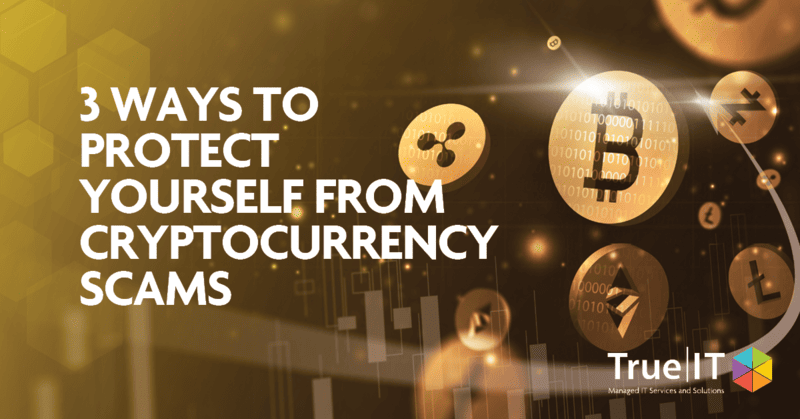How To Protect Yourself From Cryptocurrency Scams And Frauds

Cryptocurrency has gained significant popularity in recent years, attracting both investors seeking lucrative opportunities and scammers looking to exploit unsuspecting individuals. With the rise in cryptocurrency scams and frauds, it is crucial to understand how to protect oneself from falling victim to these schemes.
This article provides a comprehensive guide on safeguarding against cryptocurrency scams and frauds. By grasping the fundamental concepts of cryptocurrency, conducting thorough research on reliable exchanges, implementing robust security measures, being cautious of suspicious emails and websites, educating oneself on common scams, investing only what one can afford to lose, staying informed and up to date on market trends, seeking professional advice when necessary, and reporting any suspicious activity, individuals can effectively shield themselves from the dangers of cryptocurrency scams and frauds.
By following these guidelines, readers will be equipped with the knowledge and tools necessary to navigate the cryptocurrency landscape safely and securely.
Key Takeaways
- Choose reputable and regulated exchanges
- Use strong security measures: unique passwords, 2FA
- Store cryptocurrency offline
- Educate yourself on common scams and stay updated on the latest scams
Understand the Basics of Cryptocurrency
Understanding the fundamental principles and concepts of cryptocurrency is crucial in safeguarding oneself against potential scams and fraudulent activities in the digital currency market.
Cryptocurrency is a decentralized digital currency that operates on a technology called blockchain. It offers secure and transparent transactions, free from intermediaries such as banks.
To protect oneself from scams and frauds, individuals must comprehend the key features of cryptocurrencies, including decentralized control, cryptographic security, and immutability.
Moreover, it is essential to understand the different types of cryptocurrencies, such as Bitcoin, Ethereum, and Litecoin, as they vary in terms of functionality and purpose.
Familiarizing oneself with the basic terminology, such as wallets, private keys, and public addresses, is also crucial.
By acquiring a solid understanding of the basics, individuals can make informed decisions, identify potential risks, and protect themselves from cryptocurrency scams and frauds.
Research and Choose Reliable Exchanges
When it comes to choosing a reliable cryptocurrency exchange, it is crucial to look for reputable and regulated platforms. Reputable exchanges are those that have a proven track record of providing secure and reliable services to their users.
Additionally, it is important to read reviews and user feedback to get a better understanding of the experiences of other users and their satisfaction with the exchange’s services.
Look for reputable and regulated exchanges
Reputable and regulated exchanges are a crucial element in safeguarding oneself against cryptocurrency scams and frauds.
The cryptocurrency market is largely unregulated, making it susceptible to fraudulent activities. However, by utilizing reputable and regulated exchanges, investors can significantly reduce the risk of falling victim to scams.
These exchanges are subject to strict regulatory frameworks, ensuring that they follow industry best practices and adhere to anti-money laundering and know-your-customer requirements. Reputable exchanges also undergo regular audits and provide transparent information about their operations, enhancing trust and credibility among users.
Additionally, regulated exchanges often offer insurance coverage for users’ funds, providing an added layer of protection in case of theft or hacking incidents.
By choosing reputable and regulated exchanges, individuals can minimize the likelihood of encountering fraudulent schemes and establish a secure environment for their cryptocurrency transactions.
Read reviews and user feedback
To gain insights into the reliability and user experience of different exchanges, it is advisable to carefully study reviews and feedback provided by individuals who have already engaged with these platforms. Reading reviews can help potential investors identify any red flags or warning signs associated with a particular exchange. It is important to consider both positive and negative feedback, as this can provide a more balanced perspective. Additionally, reviews can offer valuable information about the security measures implemented by the exchange, the ease of use of the platform, and the level of customer support provided. It is recommended to consult multiple sources and platforms to ensure a comprehensive understanding of the overall reputation and credibility of the exchange.
| Pros | Cons | Neutral |
|---|---|---|
| Provides excellent security measures | High transaction fees | User-friendly interface |
| Responsive customer support | Limited cryptocurrency options | Quick and easy registration process |
| Wide range of available cryptocurrencies | Lengthy withdrawal process | Regular software updates and improvements |
Use Strong Security Measures
Implementing robust security measures is crucial when safeguarding yourself from cryptocurrency scams and frauds, as they can help mitigate the risk of unauthorized access and protect your digital assets effectively.
- Use strong and unique passwords: Avoid using easily guessable passwords and opt for a combination of letters, numbers, and special characters.
- Enable two-factor authentication (2FA): This adds an extra layer of security by requiring a verification code in addition to your password.
- Keep software and devices up to date: Regularly update your operating system, antivirus software, and cryptocurrency wallet to ensure they have the latest security patches.
- Be cautious of phishing attempts: Avoid clicking on suspicious links or providing personal information to unknown sources.
- Store cryptocurrency offline: Consider using hardware wallets or cold storage solutions to keep your digital assets offline and out of reach from hackers.
By implementing these strong security measures, you can significantly reduce the risk of falling victim to cryptocurrency scams and frauds, safeguarding your investments and digital assets effectively.
Be Cautious of Suspicious Emails and Websites
Caution should be exercised when encountering suspicious emails and websites in order to prevent potential risks associated with cryptocurrency scams and frauds.
Cybercriminals often use deceptive tactics to lure unsuspecting individuals into revealing sensitive information or transferring funds to fraudulent accounts. These suspicious emails may appear legitimate, imitating reputable organizations or individuals, but often contain malicious links or attachments.
It is important to verify the sender’s identity and scrutinize the content for any signs of phishing attempts or fraudulent claims. Similarly, individuals should exercise caution when visiting cryptocurrency-related websites, as fraudulent websites may mimic legitimate platforms to deceive users into providing their personal information or accessing their digital wallets.
Implementing robust email filters, regularly updating security software, and educating oneself about common scamming techniques can help individuals identify and avoid potential cryptocurrency scams and frauds.
Educate Yourself on Common Scams and Fraudulent Schemes
Understanding the various types of scams and fraudulent schemes in the cryptocurrency world is essential for individuals to safeguard their financial assets. Education plays a crucial role in preventing falling victim to these scams.
One common scam is the Ponzi scheme, where investors are promised high returns but are actually paid with the money from new investors.
Another scheme is phishing, where scammers trick individuals into revealing their private keys or login credentials through fake websites or emails.
Additionally, there are fraudulent initial coin offerings (ICOs), where scammers create fake projects and tokens to lure investors.
It is important to stay updated on the latest scams and be skeptical of any investment that appears too good to be true. By educating oneself on these common scams and fraudulent schemes, individuals can better protect themselves from becoming victims of cryptocurrency fraud.
Only Invest What You Can Afford to Lose
When it comes to investing in cryptocurrency, it is crucial to remember the principle of ‘only invest what you can afford to lose.’
This means that you should never invest your life savings or any funds that you cannot afford to lose without significant financial hardship.
Additionally, diversifying your investments is essential to mitigate risk and protect your overall financial portfolio.
By spreading your investments across different cryptocurrencies or other assets, you can reduce the impact of any potential losses.
Don’t invest your life savings
It is advisable to exercise caution and refrain from investing your life savings in cryptocurrencies to mitigate the potential risk of falling victim to scams and frauds, evoking a sense of prudence and financial security in the audience.
Cryptocurrencies, while offering potential for high returns, are highly volatile and speculative assets. The lack of regulation and oversight in the cryptocurrency market increases the chances of fraudulent activities and schemes.
Investing your life savings in such a volatile and unregulated market can expose you to significant financial risks. It is crucial to diversify your investment portfolio and allocate only a portion of your savings to cryptocurrencies.
By adopting a conservative approach and avoiding excessive investments, individuals can safeguard their financial well-being and minimize the potential impact of scams and frauds in the cryptocurrency space.
Diversify your investments
Adopting a diversified investment strategy can help individuals mitigate the potential risks associated with cryptocurrency investments and foster a greater sense of financial security.
By spreading investments across different cryptocurrencies, individuals can reduce the impact of any single investment’s failure on their overall portfolio. Diversification allows investors to take advantage of the potential growth opportunities presented by different cryptocurrencies while minimizing the potential losses that may occur if one particular cryptocurrency experiences a decline in value.
Additionally, diversifying investments across different asset classes, such as stocks, bonds, and real estate, further reduces the risk exposure. This approach helps protect against volatility in the cryptocurrency market and ensures that individuals do not have their entire investment portfolio reliant on a single asset class, thereby providing a more stable and secure financial position.
Stay Informed and Up to Date
Remaining well-informed and staying up to date with the latest news and developments is crucial in protecting oneself from cryptocurrency scams and frauds.
The cryptocurrency market is highly volatile and constantly evolving, making it imperative for investors to stay informed about the latest trends, regulations, and potential risks.
By regularly checking reputable news sources, investors can gain valuable insights into market movements, new investment opportunities, and emerging scams.
Additionally, staying up to date with regulatory developments and government actions can help investors identify potential red flags and avoid fraudulent schemes.
It is also important to join online communities and forums dedicated to cryptocurrencies, as they can provide a platform for sharing experiences, discussing potential scams, and learning from others’ mistakes.
In conclusion, maintaining a proactive approach towards staying informed and up to date is essential in safeguarding oneself from cryptocurrency scams and frauds.
Seek Professional Advice if Needed
Consulting with a professional advisor can provide investors with valuable insights and guidance regarding the complexities of the cryptocurrency market. Given the volatile nature and increasing number of scams in the cryptocurrency space, seeking professional advice is crucial for safeguarding one’s investments. Professional advisors possess in-depth knowledge and experience in the field, enabling them to provide objective assessments of potential risks and opportunities. They can assist in understanding the intricacies of different cryptocurrencies, assessing their underlying technology, and evaluating their long-term viability. Moreover, professional advisors can offer strategic advice on diversifying investment portfolios and implementing risk management strategies. By leveraging their expertise, investors can make informed decisions and reduce the likelihood of falling victim to scams or fraudulent schemes. The following table provides a comparison of different professional advisory services available in the cryptocurrency market.
| Advisory Service | Features | Cost | ||||
|---|---|---|---|---|---|---|
| Financial Planner | Provides comprehensive financial planning and investment advice | High | ||||
| Cryptocurrency Analyst | Offers analysis and recommendations specific to cryptocurrencies | Moderate | ||||
| Legal Advisor | Provides legal guidance on regulatory compliance and security measures | High | – | Cybersecurity Consultant | Offers expertise in protecting financial data and implementing secure systems | High |
| Tax Consultant | Provides advice on tax planning and compliance to maximize financial efficiency | Moderate | ||||
| Estate Planner | Offers guidance on estate planning and wealth preservation strategies | Moderate | ||||
| Risk Analyst | Assesses potential financial risks and develops risk management strategies | High | ||||
| Retirement Planner | Helps individuals plan for a financially secure retirement | Moderate | ||||
| Insurance Advisor | Provides recommendations on insurance coverage and risk management | Moderate | ||||
| Wealth Manager | Offers personalized investment strategies and portfolio management | High | ||||
| Loan Officer | Assists in obtaining loans and provides guidance on borrowing options | Moderate | ||||
| Accountant | Offers financial record-keeping, tax preparation, and reporting services | Moderate | ||||
| Business Consultant | Provides guidance on financial efficiency and growth strategies for businesses | Moderate |
Report Suspicious Activity
To ensure a safe and secure cryptocurrency market, it is important for individuals to promptly report any suspicious activity they may come across. Reporting suspicious activity helps in identifying and apprehending fraudsters, safeguarding the interests of investors, and maintaining the integrity of the cryptocurrency ecosystem.
Here are four reasons why reporting suspicious activity is crucial:
- Early detection: Reporting suspicious activity promptly allows authorities to investigate and prevent potential scams or frauds before they cause significant harm.
- Protecting others: By reporting suspicious activity, individuals can prevent others from falling victim to the same scam or fraudulent scheme.
- Holding perpetrators accountable: Reporting helps in identifying the culprits behind the suspicious activity, ensuring that they are held accountable for their actions.
- Strengthening regulations: Reporting suspicious activity provides valuable data to regulators, enabling them to develop and enforce stronger regulations to protect individuals from cryptocurrency scams and frauds.
By actively participating in reporting suspicious activity, individuals contribute to a safer and more secure cryptocurrency market for everyone involved.
Frequently Asked Questions
How do I recover my funds if I fall victim to a cryptocurrency scam?
If you fall victim to a cryptocurrency scam, recovering your funds can be challenging. It is recommended to report the incident to your local law enforcement agency and provide any evidence or information that may assist in the investigation. Additionally, contacting the relevant financial authorities or regulatory bodies can help to explore potential avenues for recovering your funds.
What are some red flags to watch out for when choosing a reliable cryptocurrency exchange?
When choosing a reliable cryptocurrency exchange, it is important to watch out for red flags. These may include a lack of regulatory compliance, poor customer reviews, limited security measures, and unclear or overly complex terms and conditions.
Are hardware wallets more secure than software wallets?
Hardware wallets are generally considered more secure than software wallets due to their physical nature and offline storage of private keys. However, the overall security of a wallet also depends on other factors such as user behavior and adherence to best practices.
Can I trust all the information I find on cryptocurrency forums and social media groups?
The trustworthiness of information found on cryptocurrency forums and social media groups cannot be assumed. Due to the lack of regulation and verification, it is important to critically evaluate and corroborate information from multiple reliable sources before making any decisions.
What are some common tactics used by scammers to trick people into revealing their cryptocurrency wallet information?
Common tactics used by scammers to trick people into revealing their cryptocurrency wallet information include phishing emails, fake websites, social engineering, Ponzi schemes, and fake mobile apps. These tactics exploit people’s trust and lack of awareness regarding security measures.







